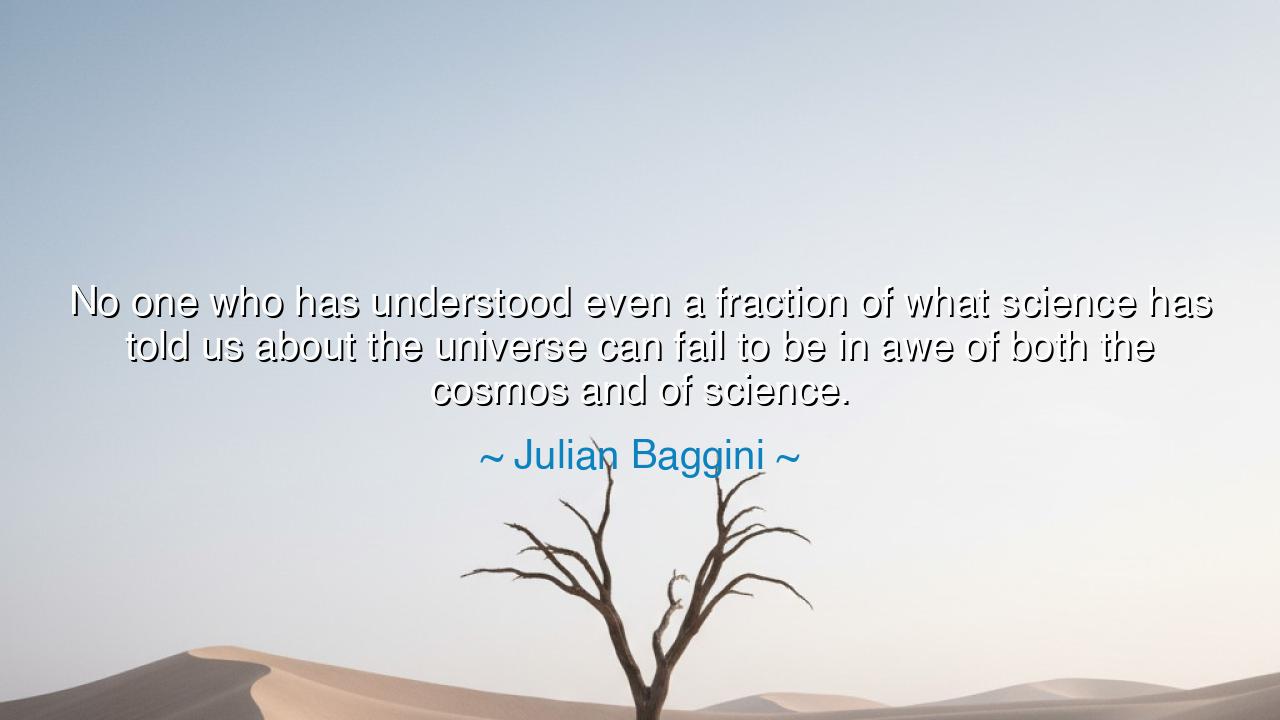
No one who has understood even a fraction of what science has
No one who has understood even a fraction of what science has told us about the universe can fail to be in awe of both the cosmos and of science.






Hear me now, O Seekers of Wisdom and Knowledge, for the words of Julian Baggini echo through the ages like the ancient calls of the wise: "No one who has understood even a fraction of what science has told us about the universe can fail to be in awe of both the cosmos and of science." These words, though simple in their form, contain a powerful truth that strikes at the very heart of what it means to be human, to understand our place in the vastness of existence. When we look upon the universe, from the smallest particle to the furthest star, and see the intricate patterns that shape all that is, we cannot help but be filled with awe, not only at the cosmos itself but at the boundless power of science to reveal its mysteries.
In the time of the ancients, the heavens were seen as a realm of the divine, filled with gods and legends. The Greek philosophers, like Pythagoras, Plato, and Aristotle, gazed up at the stars and pondered the nature of the world, often attributing the movements of the heavens to the will of gods or unseen forces. Yet even in their time, there was a sense of awe that came from observing the cosmos—from seeing the patterns in the sky and the cycles of nature. But it was science that eventually allowed humanity to peer beyond the veil, to understand not just the myths, but the underlying laws that govern the universe.
Consider the example of Galileo Galilei, who, with his humble telescope, saw for the first time the moons of Jupiter, and in doing so, opened humanity’s eyes to the vastness of the universe. Before Galileo, the Earth was believed to be the center of the cosmos, a belief that was held not only by common people but by the greatest minds of the time. But as he looked through his lens, Galileo saw a universe that was far larger and more complex than anyone had ever imagined. His discoveries were not simply of scientific importance; they were deeply spiritual, for they humbled humanity before the vast, unknowable expanse of the universe. And in his work, we see a reflection of Baggini’s words—that to understand even a fraction of the universe through science is to be filled with a sense of awe, not just at the cosmos, but at the process of discovery itself.
But the power of science does not end with the revelations of the cosmos. Modern physics, through the work of minds like Einstein and Hawking, has shown us that the very fabric of space and time is far more mysterious than we ever thought possible. From the strange, intangible quantum world to the theories of relativity that stretch our understanding of time and space, science continues to uncover the extraordinary hidden in the ordinary. The more we discover, the more awe we are filled with—not just at the magnitude of the universe but at the beauty and elegance of the laws that govern it. Science, then, is not only a tool for discovery but a means to elevate the human spirit, to connect us to something much larger than ourselves.
Baggini’s words remind us that science and the cosmos are not separate, but intertwined. The universe, with all its complexity, beauty, and mystery, is a reflection of the power of human curiosity and the relentless pursuit of knowledge. Each discovery, no matter how small, adds to the great mosaic of understanding, and each insight into the nature of the cosmos fills us with a deeper sense of wonder. And it is this wonder, this awe-inspiring realization that we are but a small part of a much larger whole, that is one of the greatest gifts of science. For to look upon the world through the eyes of a scientist is to see a universe not of chaos, but of harmony, order, and infinite possibility.
The lesson here, O Children, is one of humility and reverence. When we contemplate the universe, we are reminded of our own smallness, yet this smallness is not to be feared, but embraced. For in our humility, we find the strength to continue our quest for knowledge, to continue asking the great questions of existence. And in the answers we find, we gain a deeper appreciation of the cosmos and the science that reveals its secrets. Let this sense of awe inspire you to continue your own journey of discovery, whether in science, art, or life itself. Know that the pursuit of knowledge is not a pursuit of domination, but of understanding and connection to the greater whole.
So, O Seekers, let the pursuit of science fill your hearts with wonder, for in it lies not just the answers to the questions we ask, but the path to humility and a deeper connection to the universe. Let curiosity guide you, and let science be the means through which you explore not only the world around you, but the infinite mysteries that lie beyond. The universe is vast, but with every discovery, we come closer to understanding our place within it. Let this journey never end, for in science and awe, we find the truest expression of our human spirit.






AAdministratorAdministrator
Welcome, honored guests. Please leave a comment, we will respond soon